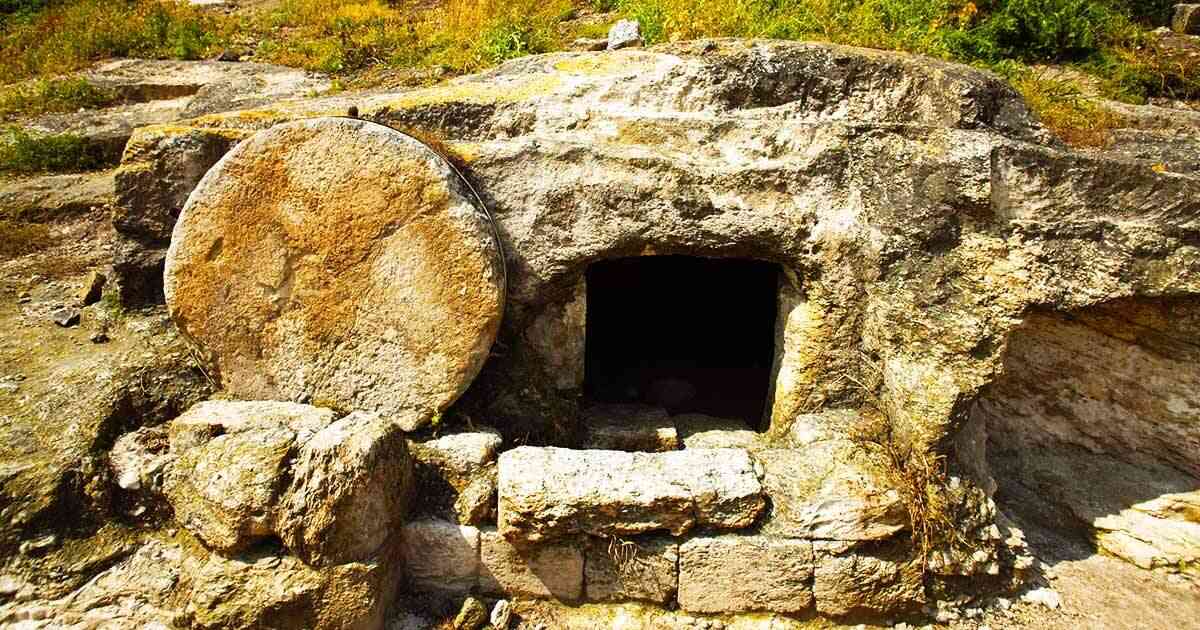
When it was time for Jesus’ body to be brought down from the Cross, Pilate received a surprise visit from a high-ranking member of the Sanhedrin who was a secret follower of Jesus. His name was Joseph, from the city of Arimathea; thus, we know this man as Joseph of Arimathea. He was accompanied by another high-ranking member of the Sanhedrin who was also a secret disciple of Jesus. This second man’s relationship with Jesus began with a secret visit in the middle of the night, recorded in John 3:1-21. That second admirer was Nicodemus.
To obtain an accurate picture of Joseph of Arimathea, we must turn to Mark 15:42-43, which says, “And now when the evening was come, because it was the preparation, that is, the day before the Sabbath, Joseph of Arimathaea, an honorable counseller, which also waited for the kingdom of God, came, and went in boldly unto Pilate, and craved the body of Jesus.”
When Mark 15:43 tells us Joseph of Arimathea “…waited for the kingdom of God…,” this doesn’t refer to a do-nothing, “hang-around-and-see-what-happens” kind of waiting. Joseph was earnestly looking for and anticipating the Kingdom. He was inwardly ready to take it, to fully receive it, and to embrace it without any reservation or hesitation.
This explains why Joseph was attracted to the ministry of Jesus. Because of his deep hunger and longing to see the Kingdom of God, he ventured out to see this Jesus of Nazareth. Spiritual hunger is always a prerequisite to receiving the Kingdom of God, and Joseph of Arimathea possessed that hunger. His willingness to think “outside the circle” of how others in the Sanhedrin thought no doubt made him unique in the supreme council. However, it appears that the other members of the council shut their eyes and tolerated him due to his prominent position and extreme wealth.
Next Mark tells us that Joseph of Arimathea went “boldly unto Pilate.” Although he was undoubtedly known for his spiritual hunger, John 19:38 informs us that this Joseph had never publicly announced that he was a follower of Jesus “for fear of the Jews.”
As a member of the Sanhedrin, Joseph was well aware of the exultation the supreme council members felt over Jesus’ death. If it became known that Joseph was the one who took the body and buried it, it could place him in considerable jeopardy. Therefore, going to Pilate to request that he might remove the body of Jesus before the Sabbath began was an act of bravery on Joseph’s part.
Joseph’s desire to take the body of Jesus and prepare it for burial was so powerful that Mark 15:43 says he “craved the body of Jesus.” The word “craved” is the Greek word aiteo, a word that means to be adamant in requesting and demanding something.
Although Joseph showed respect toward Pilate’s position, he also presented a strong demand to the governor, adamantly insisting that Jesus’ body be released to him.
- Ordinary citizens or foreign capital? July Moyo must choose
- Grace tidings: Relax it is a done deal
- Grace tidings: Relax it is a done deal
- Unpacking Christ; our wisdom (2)
Keep Reading
It was not permitted for a Jew’s body to hang on a cross after sunset or to be left to rot or for the birds to devour.
Mark 15:44,45 says, “And Pilate marveled if he were already dead: and calling unto him the centurion, he asked him whether he had been any while dead. And when he knew it of the centurion, he gave the body to Joseph.”
At this point, Nicodemus enters the picture. The third chapter of John gives the greatest insight into Nicodemus. It says, “There was a man of the Pharisees, named Nicodemus, a ruler of the Jews: the same came to Jesus by night and said unto him, Rabbi, we know that thou art a teacher come from God: for no man can do these miracles that thou doest, except God be with him”.
John 3:1 tells us that Nicodemus was a “Pharisee.” The word “Pharisee” means the separated ones. This means they viewed themselves separated by God for His purposes; thus, they were extremely committed and even fanatical in their service to God.
During the time Jesus lived, the Pharisees were the most respected and esteemed religious leaders in Israel. The Pharisees believed in the supernatural and earnestly waited for the arrival of the Messiah, contrary to the Sadducees who did not believe in the supernatural and did not wait for the Messiah’s coming. The Pharisees held strictly to the Law, whereas the Sadducees took a more liberal approach to the Law that the Pharisees found unacceptable. Flavius Josephus, the famous Jewish historian, was a Pharisee, as was Gamaliel (Acts 5:34) and the apostle Paul before he was converted to Christ on the road to Damascus (Philippians 3:5).
Verse 1 states that Nicodemus was “a ruler of the Jews.” The word “ruler” is the Greek word archon, which means the chief one, ruler, or prince. This word was used to denote the rulers of local synagogues and members of the Sanhedrin who were the highest authorities in the land. Due to this high-ranking position, Nicodemus, like Joseph of Arimathea, was prominent, influential, and wealthy.
Nicodemus’ notoriety among the Jews in Jerusalem was the reason he visited Jesus by night. Nicodemus’ fame most likely created a stir every time he passed through the city. Therefore, he wanted to avoid visiting Jesus by day, as it would draw attention to the fact that he was spending time with a teacher the Sanhedrin viewed to be a maverick and out of their control. Consequently, Nicodemus came to Jesus by night when his visit would not be observable.
What he told Jesus during this visit reveals much about the spiritual hunger that Nicodemus possessed. First, he called Jesus “Rabbi.”
The word itself means great, but it was used as a title of respect that was used only in reference to the great teachers of the Law. The Pharisees loved to be called “Rabbi,” for they viewed themselves as the chief keepers of the Law.
For Nicodemus to call Jesus “Rabbi” was remarkable indeed. The Jewish leader would never have used that title unless he had already heard Jesus interpret the Law and thereby judged His ability to do so. The fact that Nicodemus called Jesus by this privileged title, given only to those who were viewed as the greatest theologians in Israel, tells us that he was very impressed with Jesus’ knowledge of the Scriptures.
This means that Nicodemus, like Joseph of Arimathea, was open-minded enough to receive from people who were “outside the circle” of what most religious people viewed as acceptable. In fact, Nicodemus was so hungry to find a touch of God that it appears he himself visited Jesus’ meetings that had just been conducted in the city of Jerusalem.
It seems that Nicodemus had come close enough to these miracle meetings to personally view the miracles. This must have been the occasion when he heard Jesus teach and deemed Him worthy of the title “Rabbi.” As a Pharisee, Nicodemus believed in the supernatural. He was so moved by the miracles and so convinced of their legitimacy that he wanted to personally meet Jesus and ask Him questions.
After Joseph of Arimathea received permission to remove Jesus’ body from the Cross, he took the body to begin preparations for burial. John 19:39 tells us what happened next: “And there came also Nicodemus, which at the first came to Jesus by night, and brought a mixture of myrrh and aloes, about a hundred- pound weight.” Myrrh” was an expensive yellowish-brown, sweet-smelling gum resin that was obtained from a tree and had a bitter taste.
Nicodemus’ cost for this offering of love must have been out of sight! Only a rich man could have purchased such a massive combination of these costly, uncommon substances. Nicodemus obviously intended to fully cover the body of Jesus, so he spared no cost in preparing the body for burial, demonstrating his love for Jesus right up to the very end.
Although Joseph and Nicodemus lived in circumstances that made it difficult for them to publicly follow Jesus, they chose to follow Him to their fullest capability.











